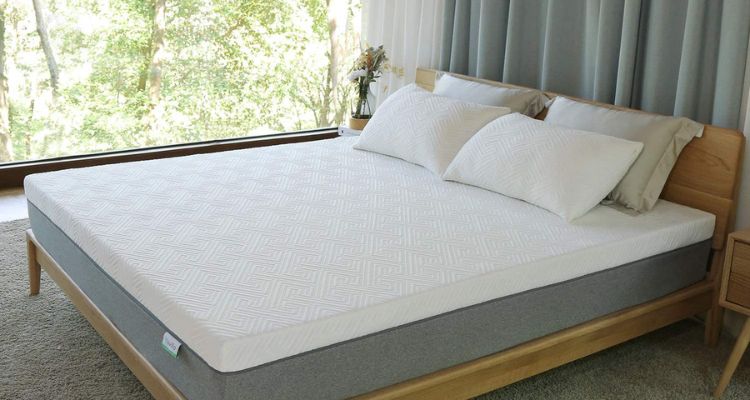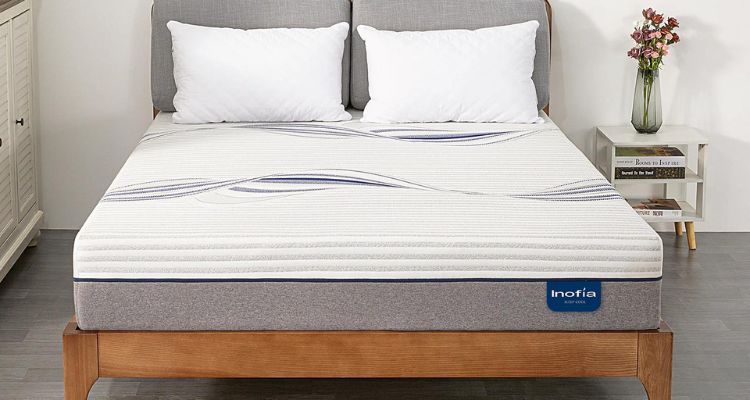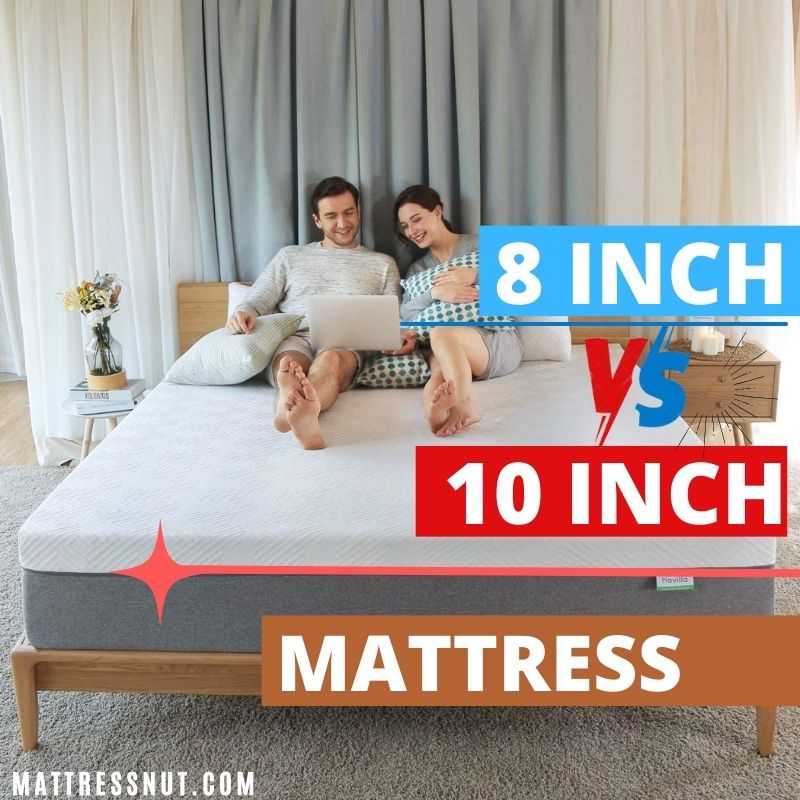If you’re considering buying a mattress (also check top rated mattresses on the market), you may have encountered this common issue: an 8-inch mattress or a 10-inch?
Luckily, the answer is straightforward to figure out. And it all has to do with how you sleep and your body weight, along with a few other things.
So, without any further ado, let’s get right into it.
Should You Buy An 8-Inch Vs. 10-Inch Mattress? (Our favorite is Puffy 10″) or Saatva for a more high-end option
Best for couples who sleep hot
Novilla comes with a 10-inch thickness memory foam mattress. This is for couples who sleep hot and want extra support. The mattress features contouring support with excellent pressure relief and motion isolation.
4 unique layers come together to provide the best sleeping experience for couples (also check the best selling mattresses for couples). The base layer is made of high-density foam to provide support and stability. It’s crucial to ensure that the bed does not sag over time.
The next layer is the breathable air-circulation foam. This foam let’s excellent air pass through, keeping you cool all night. The layer above this complements it, with excellent airflow paired with comfort.
Right above that is the gel-infused memory foam layer. Memory foam has a special contouring effect that’s best for people who have back problems and want more support. But this memory foam is gel-infused and has a special gel that maintains a cooler temperature.
The Novilla Queen Mattress has a firmness rating of Medium-Firm. This means it slightly leans towards the firmer end. It’s excellent for cradling your pressure points and cutting down on back pain (also check the top-rated mattress toppers for back pain).
People who weigh under 130 pounds will prefer a softer mattress. The Novilla Bliss 10-inch mattress is ideal for people between 130 to 230 pounds.
If you live in a hotter climate and want even more cooling, you can pair your mattress with a Novilla Shredded Memory Foam Cooling Pillow.

How To Choose Mattress Thickness:
Mattress thickness is something that people often overlook. Nevertheless, mattresses can be found in a few thickness ranges:
- Low Profile: 2”-5”
- Slim: 5”-8”
- Standard: 8”-12”:
- Thick, Tall, or Deep: 12”-16”
- Extra Thick, Extra Tall, or Extra Deep: 16”+:
Low Profiles never feature layers and are great for air mattresses or toddlers. Slim mattresses may feature 2 layers. More premium mattresses often feature 3-4 layers, which is why they are thicker, between 8” and 12”.
If you’re fond of extra tall mattresses, Thick and Extra Thick mattresses will please you. Side-sleepers, in particular, will love thicker mattresses, between 12” and 14”, as these provide the most cushioning. However, back and stomach sleepers will be more than happy with 10” mattresses (check 10 great mattresses for stomach sleepers).
Is An 8-Inch Or 10-Inch Mattress Better?
So, is an 8-inch or 10-inch mattress better? The answer to that boils down to a few factors. Firstly, what type of sleeper are you? Back and stomach sleepers both will love 8” or 10” mattresses. However, side sleepers might prefer the 10” version as it’s thicker, though it’s better to go for a 12” mattress entirely. Combination sleepers may find 10” mattresses more comfortable as they can quickly shift sides and positions.
Secondly, consider the height of your bed base. Although two inches isn’t a lot as a bed base, it can make a difference. The total height of your bed, including the bed base and the mattress plus the topper, should not exceed 25”.
Next, consider if you have any medical conditions. People with back pain, arthritis, and joint pain, may find it harder to get in a taller bed or get out of it. Even two inches can be a massive difference. So, if you have any medical conditions, opt for an 8” mattress.
Factors To Consider While Buying an 8-inch or 10-inch mattress:
Sleep Position:
Sleep position is by far the most important thing to consider. People who sleep on their back or stomach will find both 8” and 10” mattresses comfortable. However, side sleepers will have a troublesome time getting used to the thickness. Hence, either opt for a thicker mattress (in the 12”-14” range) or pick the 10” mattress.
Combination sleepers will generally be satisfied with a 10” mattress. This is because it will accommodate all sleeping positions.
Besides the mattress’s overall thickness, consider the comfort layer’s thickness. This layer above the base layer provides comfort, motion isolation, pressure relief, and the like. For back and stomach sleepers, they will prefer a thinner comfort layer. It will help with spinal misalignment. However, side sleepers will love a thicker comfort layer that they can sink into. Combination sleepers will need a mattress with a balanced base and comfort layer (check the top rated mattresses for combination sleeper).
Medical Condition:
Any specific medical conditions will change what thickness of the mattress you will prefer. You should opt for thinner mattresses if you have any issues like back pain, arthritis, joint pain, or disability.
People with back pain prefer a mattress between 8” and 12” in thickness to feel better (also check 10 amazing mattresses for back pain). Additionally, consider a mattress with a medium-firm firmness rating. Such mattresses provide more support for your spine and keep you from sinking.
People with shoulder or hip pain should prefer a thicker mattress, preferably between 12” and 14”. This lets them sink into the mattress and cradle their pressure points. Additionally, look for mattresses with thicker comfort layers.
Bodyweight:
Lightweight individuals that weigh less than 130 pounds will prefer a thinner mattress, preferably thinner than 8”. The comfort layer can be thin, but that depends on other factors like your medical conditions and sleeping position.
People that weigh between 250 and 400 pounds will prefer a mattress that is at most 10” thick. These mattresses provide the best support and don’t feel too high. However, if you weigh more than 400 pounds, consider a mattress that is thicker than 14”.
In general, the thickness of the mattress is directly correlated to your weight. So, if you’re heavier, you should use a thicker mattress.
The thickness of the comfort layer is essential. Heavier people prefer a thicker comfort layer that’s firmer to provide more support (check 10 great mattresses for overweight person).
Bed Sharing:
Bed sharing is the next most crucial factor you should consider. Do you share your bed with your partner? If so, your mattress has to endure more pressure than it would take if you were sleeping on it. So, if you plan on buying a thin mattress for yourself, consider ditching that and purchasing a thicker one if you share a bed. Thicker mattresses will provide more support and won’t sink as much.
Other factors, such as your partner’s body weight and medical conditions, should be considered. Generally, a mattress that is either 10” or 12” thick is perfect for couples. But if you or your partner sleep heavier or are side sleepers, you can easily opt for a thicker mattress.
Bed Height:
When deciding the right thickness for your mattress, you should consider the bed height. The overall size of your bed, including the height of your bed base, mattress, and topper, should be less than 25”. It’s recommended to buy a mattress that’s just the right height when paired with the bed base. If your body weight or sleeping position calls for a thicker mattress, consider lowering the bed base.
Sleeper’s Temperature:
Lastly, consider how hot or cool your sleep is. Again, this has to do with how your body works and the external climate. You’ll often wake up in sweat if you have a naturally lower body temperature or live in hotter weather.
So, what does mattress thickness have to do with this? Mattress thickness will decide how hot your mattress gets. If your mattress is thinner, it will allow a lot of air to pass through. But if your mattress is thicker and has many layers, it might feel hot to sleep on (also check 10 amazing cooling mattresses for hot sleepers).
Of course, other factors come into play here, such as the foam’s breathability and if any gel has been used. Additionally, innerspring mattresses will have more ventilation than memory foam mattresses.
Is An 8 Inch Mattress Too Thin?
8 inches is the perfect height for most people. For side sleepers, however, 8 inches may be too thin. The height is ideal for getting in and out of bed for people with back and joint pain. And it sleeps very coolly too.

Pros And Cons of A 8-Inch Mattress:
Pros:
- Perfect for back and stomach sleepers.
- Suitable for people who weigh between 250 to 400 pounds.
- Less expensive as it features thinner layers.
- Up to the mark for thicker bed bases.
- Great for people who have trouble getting in and out of bed.
Cons:
- Lesser cushioning.
- Not adequate for side and combination sleepers.
- Not the best for two adults.
- Feels too low-profile with shorter bed bases.
- Not ideal for overweight people.
Pros And Cons of A 10-Inch Mattress:
Pros:
- Provides more cushioning.
- Great for all types of sleepers.
- Perfect for people who weigh between 250-400 pounds.
- Works best with thinner bed bases.
- Best for couples and people with kids.
Cons:
- May feel too elevated for lighter sleepers.
- Maybe satisfactory for people who have trouble getting in and out of bed.
- It might feel too elevated with thicker bases.
- More expensive.
- Heavier since it features more layers.
Key Takeaways: 8-Inch Vs 10-Inch Mattress
Essential Factors for Selection
The decision between an 8-inch and a 10-inch mattress significantly hinges on individual sleep preferences, body weight, and specific needs. For back and stomach sleepers, an 8-inch mattress could provide a firmer support, while side sleepers might find the extra cushioning of a 10-inch mattress more comforting.
Special Considerations for Sleep Positions
Side sleepers often benefit from a thicker mattress due to the additional cushioning which is gentle on the shoulders and hips. On the other hand, back and stomach sleepers might appreciate the firmer support offered by an 8-inch mattress which helps in maintaining spinal alignment.
Body Weight and Mattress Thickness
Lightweight individuals (under 130 lbs) may find an 8-inch mattress adequate, while those weighing between 250 to 400 pounds might prefer the extra support from a 10-inch mattress. The thickness of the mattress correlates with the body weight, providing the requisite support and comfort.
Couples’ Comfort and Mattress Thickness
Couples may lean towards a 10-inch mattress due to its ability to provide better support and resist sagging under increased weight. The thicker mattress accommodates the combined weight of two individuals, ensuring a comfortable sleep experience.
Considerations for Individuals with Medical Conditions
People with medical conditions like back pain, arthritis, or joint pain may find the height and support of an 8-inch mattress easier to manage. The lower profile is also easier for getting in and out of bed, which is a crucial factor for those with mobility issues.
Temperature Regulation and Mattress Thickness
Thicker mattresses tend to retain more heat compared to thinner ones. However, the material and construction of the mattress also play a vital role in temperature regulation. Individuals living in warmer climates or those who sleep hot might want to consider the breathability and cooling features of the mattress, regardless of its thickness.
Height of Bed Base
The total height of the bed, including the mattress and bed base, should not exceed 25 inches for ease of access. If a thicker mattress is desired due to body weight or sleep position preferences, adjusting the height of the bed base accordingly is advisable.
Cost Implications
Generally, 8-inch mattresses are less expensive due to thinner layers, while 10-inch mattresses might be priced higher due to additional material and potentially more complex construction.
Our Recommendation:
To conclude, the average mattress thicknesses are between 8-inch and 10-inch mattresses. 8-inch mattresses are perfect for people who want sleep quality and weigh less, sleep alone, and sleep on their backs or stomachs (also check the great mattress toppers for stomach sleepers). For side sleepers, couples, and heavier sleepers, a 10-inch mattress is suggested.
However, if you have a condition that makes it harder to get in and out of bed, we highly suggest an 8-inch mattress. Consider the height of your bed base as the total height of your bed should not exceed 25 inches.



